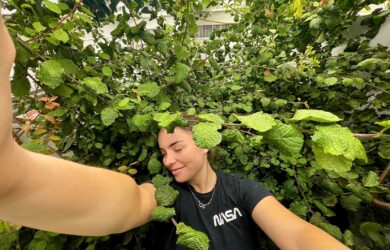
The world's first global inter-generational biotech leadership summit has been launched by University of Cambridge students, including a Gates Cambridge Scholar.
The world’s first global inter-generational biotech leadership summit featuring Nobel Prize winner Professor Ada Yonath and leading experts as well the future bio leaders has been launched by University of Cambridge students, including a Gates Cambridge Scholar.
Applications for the Global Biotech Revolution’s Gap Summit will open on 1st October. The aim of the summit is to inspire the next generation of biotech leaders and to make connections between today’s leading experts and those who are rising up the ranks, whether they are students, researchers, professionals or entrepreneurs.
Confirmed speakers include Prof Ada E Yonath, the pioneer of monoclonal antibodies Sir Gregory Winter, CEO of Burill and Co. Steven Burrill, CEO of Roche Group Dr Severin Schwan, the Executive VPs of Merck Serono and Astra Zeneca Dr Annalisa Jenkins and Menelas Pangalos and Genspace founder Ellen Jorgensen.
Professor Yonath is the Martin S. and Helen Kimmel Professor of Structural Biology and Director of the Helen and Milton A. Kimmelman Center for Biomolecular Structure and Assembly at the Weizmann Institute of Science, Israel. She was the joint recipient of the Nobel Prize in Chemistry 2009 “for studies of the structure and function of the ribosome” – research which has been used to develop new antibiotics which kill germs by blocking their ribosomes, while keeping the patient’s ribosomes intact.
Sir Gregory Winter is master of Trinity College, Cambridge and Deputy Director of the Laboratory of Molecular Biology at Cambridge which is funded by the Medical Research Council. He pioneered therapeutic monoclonal antibodies – the use of monoclonal antibodies to specifically bind to target cells or proteins, stimulating the patient’s immune system to attack those cells. He has founded two biotech companies Cambridge Antibody Technology and Bicycle Therapeutics.
Steven Burrill founded and has been Chief Executive Officer of Burrill & Company, a venture capital and merchant banking firm, since 1994. He is also a founder and currently serves as Chairman of the Board of the National Science and Technology Medals Foundation and as Chairman of Global Virus Network.
Summit
The summit will take place from 31 March to 2 April 2014 at the University of Cambridge. There are places for 100 young bio-leaders from around the world. They will discuss issues ranging from research and innovation to future health and resources with current biotech think tanks, industrial leaders, policy makers and research pioneers. The summit will ask them to challenge the current state of the global bio-economy and consider grand challenges that the field will need to address by 2050.
Global Biotech Revolution (GBR) is a registered student-led foundation whose mission is to inspire young people and support the next generation of leaders to ensure the sustainability and growth of the global bio-economy. This is achieved through three core values: the need to challenge current knowledge, challenge industrial dogmas, challenge current leaders, and challenge each other; a desire to grow their knowledge, trainings, skills, and perspectives; and the impulse to connect leaders of today with leaders of tomorrow and with students and media in their countries.
“The new ventures and opportunities that will arise from the creative clash between the experience of the leaders of today and innovative thinking of the young leaders of tomorrow is what excites us to build this platform,” says Ipshita Mandal, founder of GBR.
Gates Cambridge Scholar Divya Venkatesh [2011], who is chief editor of the initiative and coordinates articles blogs and media releases on the summit, became involved as a result of her interest in biotechnology [she did her undergraduate degree in the subject] and in public engagement. She is currently doing a PhD in Pathology, exploring fundamental aspects of parasite biology, particularly Trypanosomes, which are the causative agents of African sleeping sickness. She says: “By providing a shared platform to young biotech enthusiasts as well as the current leaders of the field, this summit is the first attempt on a global scale, to bridge one of most crucial gaps in a new and growing industry and foster a more connected and collaborative future.”
For details contact the GBR team or email ipshita.mandal@globalbiotechrevolution.com. See http://gap.globalbiotechrevolution.com/ for more details.
Picture credit: ddpavumba and www.freedigitalphotos.net.












